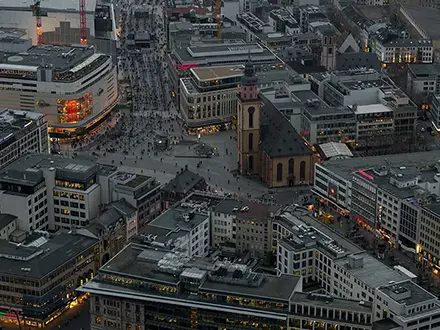
 Germany
Germany
- TitleColor: #333333
- DateColor: #999999
- SizeFont: 60
- FlagImg URL: /images/flags/Flag_of_Germany.svg
- TitleImageSizes: 1900,1440,720
Germany - Contents
General Information Toll Roads Speed Limits Headlights Petrol Parking Car Equipment TiresGeneral Information
About roads, speed limits, mandatory car equipment, and some rules of the road. In the sections below, you can read more detailed information about toll roads, petrol costs, parking, speed limits, etc.
| No road tolls for passenger cars; tolls apply to some tunnels and entry to certain cities. | |
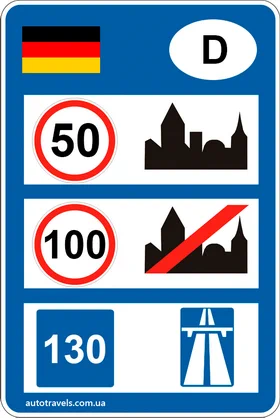 |
Within populated areas – 50 km/h Outside populated areas – 100 km/h Autobahn – recommended 130 km/h Use headlights in poor weather conditions. |
| Maximum blood alcohol level 0.3 ‰ (0.5 ‰ if traffic rules are not violated) Using a phone while driving is prohibited. |
|
| Winter tires are mandatory in the presence of snow or ice. Tire chains are allowed only on specific sections marked with a special sign. Studded tires are prohibited. |
|
|
|
Mandatory equipment:
Recommended equipment:
|
| Seat belts are mandatory for all passengers. For transporting children – a child seat is mandatory for children under 12 years old; children under 150 cm - child seat only on rear seats. |
Toll Roads
No charges apply for using roads in Germany.
Only a few tunnels and entry to environmental zones in certain cities are subject to tolls.
Environmental Zones in Cities (Umweltzone)
Environmental zones in cities are established to prevent air pollution. The beginning and end of the zone are marked by special signs. Under the starting sign, there is a plaque indicating the color of the badge (Plakette) allowed to enter the zone.
Start of the zone:
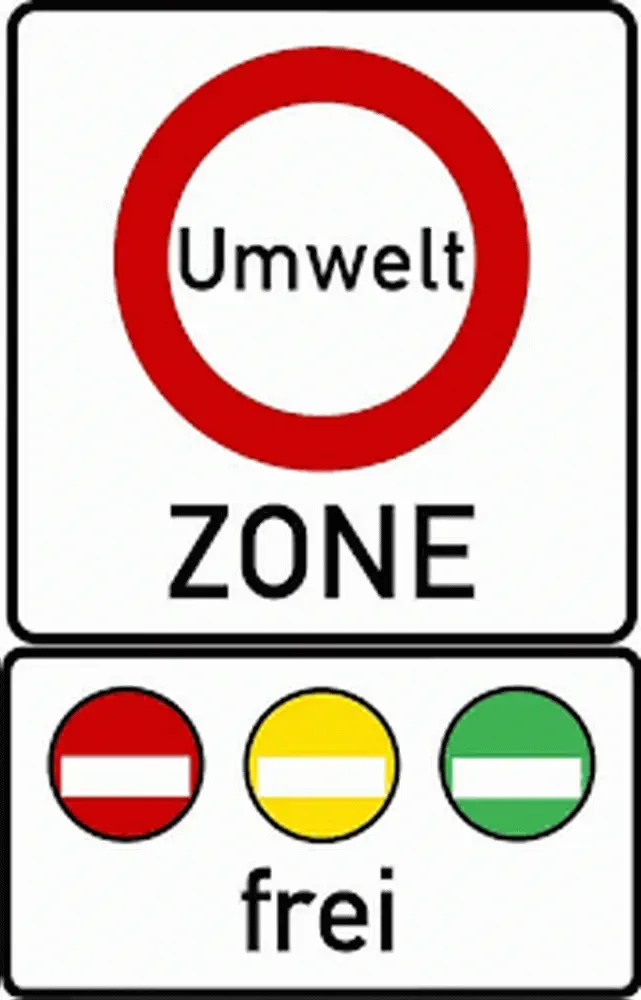
End of the zone:
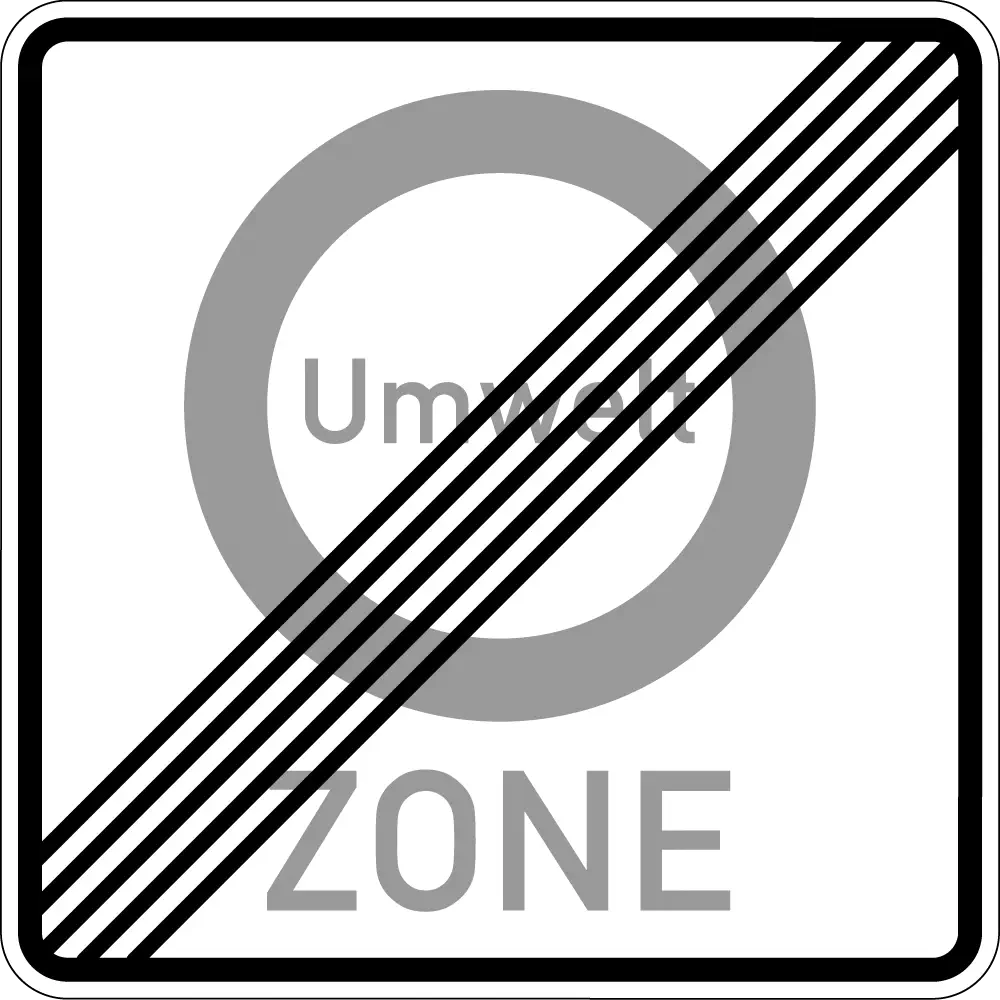
Badges — Plakette
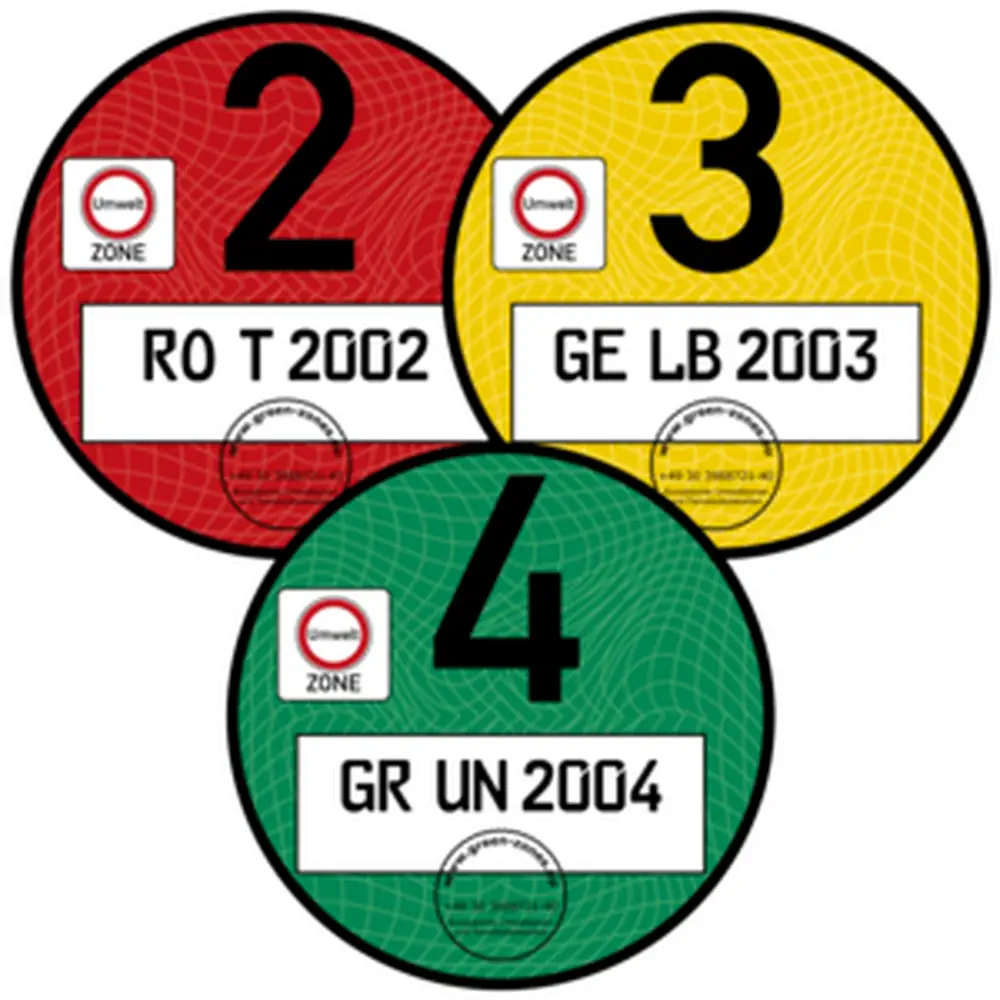
The badge is a sticker that, after purchase, should be placed in the lower right corner of the windshield (for a regular car — the lower corner on the passenger side), from the inside of the glass.
Badges come in 3 colors:
- Red — car complies with Euro 2 standard
- Yellow — car complies with Euro 3 standard
- Green — car complies with Euro 4 and higher standards
If the sign under the environmental zone's starting sign shows only a green badge icon, entry is allowed only for vehicles with a green badge. Even if the car complies with Euro 4 and higher standards but lacks a sticker, the driver will be fined 80 euros.
Official website for environmental zones (in English): https://www.umwelt-plakette.de/en.html
Cost of the Badge
Official cost is 6 euros.If ordered online with delivery to Ukraine, it will be around 40 euros.
If purchased in Germany, the cost will be between 5-8 euros depending on the location.
For example, at the Dekra station in Leipzig, the badge cost 7.3 euros.
How to Buy the Badge
Online on the website: https://www.umwelt-plakette.de/ru/internet-magazin.html. Note that delivery from Germany takes about 2 weeks.
Directly in Germany at Dekra service stations. Addresses can be found on their official website (in German only): https://www.dekra.de/de/standorte/#
In the first field, start typing the name of the city in German, suggestions will appear, select the desired city, and on the map, it will show where Dekra stations are located.
We recommend using this method to purchase the badge.
Through the hotel if it is located in an environmental zone. Contact the hotel to request them to obtain the Plakette for you.
For purchase, you will need to provide the vehicle registration document. If the vehicle complies with the standard, the badge will be issued immediately. In case of doubts, the car will be taken to a bay for inspection.
Map of Germany with Environmental Zones
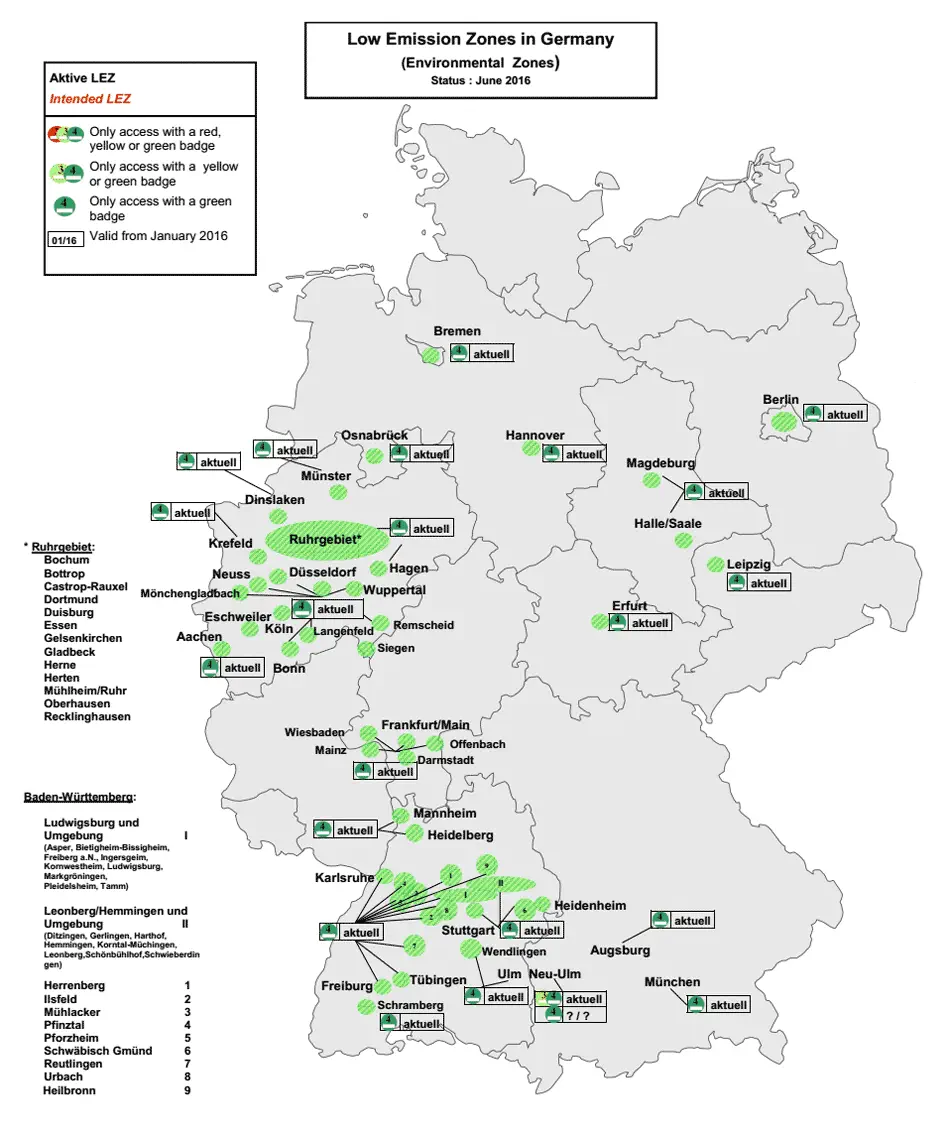
Warnowtunnel
The Warnow tunnel passes under the Warnow River to the north of the city of Rostock. Tunnel on Google Maps
Overall, the tunnel can easily be bypassed using alternative routes to avoid tolls.
| Vehicle | Winter (01.11.-30.04.) | Summer (01.05.-31.10.) | |
|---|---|---|---|
 |
Motorcycle and car with 2 axles, height up to 2.05 m without a trailer or with a low trailer | € 3.50 | € 4.30 |
| Car with 2 axles, height from 2.05 m to 2.60 m without a trailer or with it | € 4.00 | € 5.40 |
For current prices and rates for other vehicle categories, please check the website (in English): https://warnowquerung.de/en/prices/
Herrentunnel
The Herren tunnel passes under the Trave River near the city of Lübeck. Tunnel on Google Maps
The tunnel can be easily bypassed using alternative routes to avoid tolls.
| Vehicle | Tariff | |
|---|---|---|
 |
Motorcycle and car with a height (above the front axle) up to 1.3 m without a trailer or with a low trailer | € 1.90 |
| Car with a height (above the front axle) over 1.3 m without a trailer or with it | € 3.50 |
For cash payment, use the two rightmost lanes. The next 2 lanes are for coin payment at the machine.
For current prices and rates for other vehicle categories, please check the website (in German): https://www.herrentunnel.de/index.php/maut-tarife/maut-tarife-2.html
Rossfeldpanoramastraße
The high-altitude road passes through the Berchtesgaden National Park on the border of Germany and Austria. The road is 15.4 km long. The highest point is 1,570 m. The maximum slope is 13%, and the altitude difference is 1,100 meters. The road traverses picturesque alpine meadows. Road on Google Maps
| Vehicle | Tariff | |
|---|---|---|
| Passenger car | € 8.50 | |
| Motorcycle | € 5.00 | |
| Bus | € 60 |
For more information about the road, you can read on the official website (in English): https://www.rossfeldpanoramastrasse.de/en/ For current prices, it's better to check the German version of the website.
Speed Limits

Standard speed limits in Germany (unless otherwise indicated on road signs).
Cars, motorcycles:- Within built-up areas – 50 km/h
- Outside built-up areas – 100 km/h
- On the autobahn – Recommended 130 km/h
Dipped Beam
Dipped beam is not mandatory except in poor visibility and during the dark hours.
Gasoline Prices in Germany
Parking in Germany
In most cities, parking on city streets is paid and time-limited.
Some parking areas require the use of a parking disc (Parkscheibe), which can be purchased at gas stations. The disc must display the start time of parking.
The cost of parking per hour is around 2-3 euros, usually indicated on the parking meter or sign.
For full-day or multi-day parking, we recommend using P+R (Park and Ride) parking lots, which are available in many cities near train stations (not main stations) or metro/tram stations. P+R parking lots are often free of charge.
Leipzig
Messe Park and Ride (to the north) Parking on Google Maps
Free parking, located outside the environmental zone. From there, you can take tram No. 16 to Augustusplatz (city center).
An der Tabaksmühle (to the south, closer to the center than Messe) Parking on Google Maps
Parking here is also free, and you can reach the city center (Augustusplatz) by tram No. 15.
Dresden
According to search results, this is a free parking lot, but the situation may have changed. In any case, there is a paid parking lot opposite. Parking on Google MapsFrankfurt on the Main
Free P+R near the Frankfurt am Main - Stadion train station. You can reach the main station by S8 and S9 trains. Parking on Google MapsKarlsruhe
Free parking; you can walk to the city center in 30 minutes or take tram No. 1 or No. 2 (you need to walk 5 minutes to the stops). Parking on Google MapsMandatory Equipment
Equipment required to have in the car:| Reflective vest – a reflective vest is mandatory for anyone exiting the car, during the day(!) or at night in the event of a stop or accident. The vest must be in the car, not in the trunk. |
Winter Tires, Studded Tires, Chains
| For vehicles weighing up to 3.5 tons, in the presence of a continuous layer of snow or ice on the road, winter tires must be used. All wheels must be equipped with winter tires. | |
Chains are only allowed on road sections marked with a special sign. The maximum speed for a car with chains must not exceed 50 km/h |
|
| The use of studded tires is prohibited |
 travels
travels Albania
Albania Andorra
Andorra Austria
Austria Azerbaijan
Azerbaijan Belarus
Belarus Belgium
Belgium Bosnia and Herzegovina
Bosnia and Herzegovina Bulgaria
Bulgaria Croatia
Croatia Cyprus
Cyprus Czech Republic
Czech Republic Denmark
Denmark Estonia
Estonia Finland
Finland France
France Georgia
Georgia Greece
Greece Hungary
Hungary Iceland
Iceland Ireland
Ireland Italy
Italy Kosovo
Kosovo Latvia
Latvia Liechtenstein
Liechtenstein Lithuania
Lithuania Luxembourg
Luxembourg Malta
Malta Moldova
Moldova Monaco
Monaco Montenegro
Montenegro Netherlands
Netherlands North Macedonia
North Macedonia Norway
Norway Poland
Poland Portugal
Portugal Romania
Romania Russia
Russia San Marino
San Marino Serbia
Serbia Slovakia
Slovakia Slovenia
Slovenia Spain
Spain Sweden
Sweden Switzerland
Switzerland Turkey
Turkey Ukraine
Ukraine United Kingdom
United Kingdom